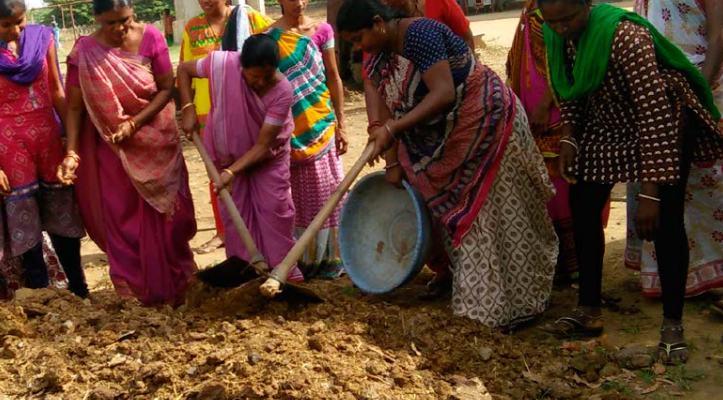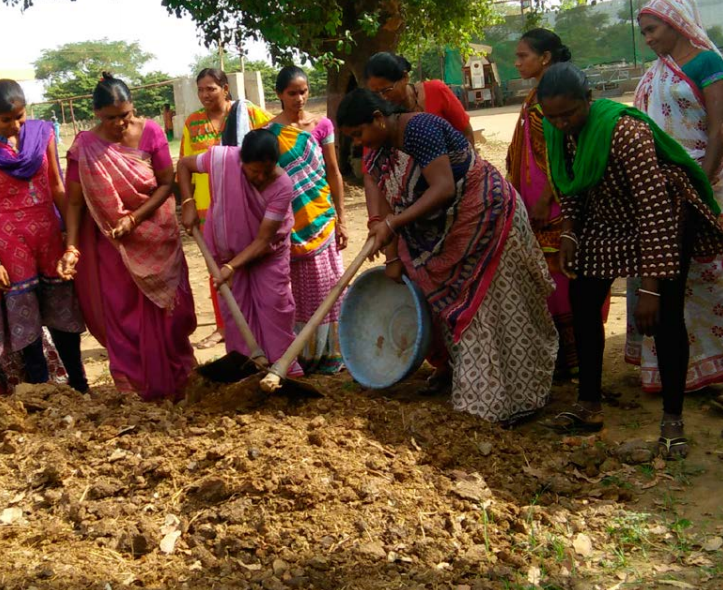The Institute for Motivating Self-Employment (IMSE), a farmers’ organization in West Bengal, is carrying out two major campaigns in support of farmers to enable them to keep the land they till and to use sustainable agriculture practices to make small-scale farming viable while protecting the environment. Village-level awareness camps were conducted to demonstrate the benefits of organic farming for farmers and the community. A parallel campaign was carried out to strengthen the Gram Sansad (village parliament).
Thanks to the assistance provided by MTCP2 since 2015, IMSE has undertaken several programmes advocating for sustainable agriculture and the promotion of self-governance in the Birbhum district of West Bengal. Meetings were held to raise awareness of environmentally harmful practices, such as the indiscriminate use of chemical fertilizers and pesticides, which is linked to the commercial production of vegetables for large corporations. Farmers’ groups and committees were formed in every village to protest against the “corporatization” of agriculture; they were joined by other civil society organizations and NGOs.
The campaigns include training of trainers programmes on organic farming, with practical applications so that farmers can test what they learn on limited areas of their farms. Some farmers hesitate to switch to organic farming as they are afraid their production will decline.
In 2016, IMSE decided to focus on marketing organic products. To facilitate this process, its members applied for recognition of their status as organic producers. This enables them to cater for the nearby Anganwadi Workers’ Training Programme by supplying the organic rice, vegetables and pulses that hundreds of IMSE members produce. These products are then used for the district’s midday meal programme.
The ongoing campaign is successfully educating farmers both on organic farming and on the disastrous effects of extensive use of chemical fertilizers and pesticides. The number of farmers adopting sustainable agriculture practices is on the increase.
Shri Ashok Mondal, 53 years old, is one of the farmer-participants of the orientation camp and trainings delivered by IMSE experts on sustainable agriculture. He produces his own organic fertilizer by setting up a compost pit in his backyard. He is cultivating eggplant and beans on his plot of 2.5 kathas (around 0.08 hectares). Mondal reports that very little investment is needed to apply sustainable agriculture methods. His initiative has served as a good example in the community, especially among marginalized peasants in Mohutar village. Many farmers are following his techniques.
His example has prompted others to come forward and step into his shoes. They are now helping each other in the preservation and exchange of local seeds and manure, and in learning sustainable agriculture production techniques. ###
About MTCP2
The Medium Term Cooperation Program Phase 2 (MTCP2), a five-year capacity building program supported by the International Fund for Agricultural Development (IFAD), the Swiss Agency for Development and Cooperation (SDC), and the European Union (EU), has been implemented in 19 countries across three sub-regions—Southeast Asia, South Asia, and the Pacific—engaging 1,544 sub-national farmers organizations (FOs) with a total membership of around 22 million farmers. The funding support (total budget of $ 5 million for the whole duration of the project across 19 countries) serves as a catalytic fund that will allow FOs to enhance their capacity to be effective channels of economic services to farmers. So far, the program has contributed to the formation of strong national platform of FOs with improved capacity to engage in policy processes and mobilize resources from mainstream agricultural development programs like extension services, credit, and pre and post harvest facilities. The program also helped in transforming farmers associations into commodity-based cooperatives to strengthen the role of small-scale farmers within an inclusive and sustainable value-chain. The program is being implemented by the consortium Asian Farmers’ Association for Sustainable Rural Development (AFA) and La Via Campesina (LVC).





Comments are closed